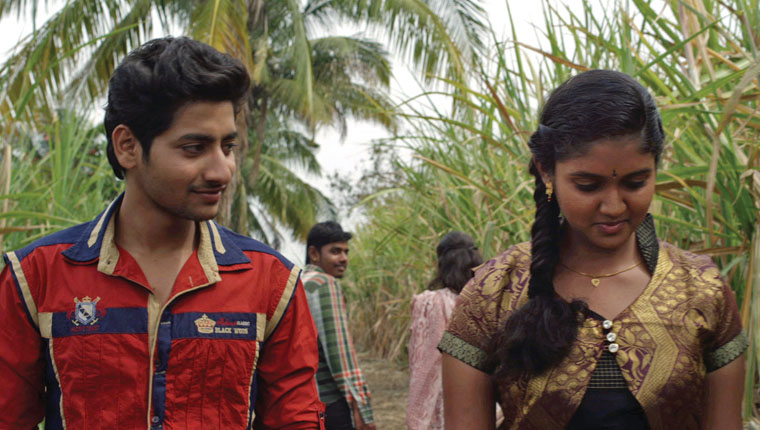Thursday, 26 July 2018
On demand: "Sairat"
Much has been written about the inspiration Indian filmmakers have drawn from Stratford-upon-Avon's very own William Shakespeare over the years: it's been most apparent in Vishal Bhardwaj's freehand Hindi versions of Othello, Macbeth and Hamlet, but the Bard has also been present in such outliers as The Hungry, the recent indie rethink of Titus Andronicus (screening as part of this year's Not Just Bollywood season at HOME in Manchester). Sairat, Marathi cinema's breakthrough film of 2016, works from an original screenplay set firmly in the present, but it looks and crucially feels Shakespearian: within its epic sweep, we glimpse balconies and letters, characters hiding behind bushes, and - at the centre of it all - two star-crossed kids.
At first, there is just Parshya (Akash Thosar), the M.S. Dhoni of his small village's cricket team, and the kind of student-athlete combo who'd be prime college material were he not such a slacker at heart; we suspect he knows all too well that he's been born into a class that isn't expected to make anything much of themselves. Enter new girl Archi (Rinku Rajguru), whose family own the surrounding farmland. Archi has the power in the opposites-attract courtship that follows - you see it in the lofty disdain she initially displays towards her goofy, bumfluffed suitor, and in the gleaming red tractor on which she pulls up outside Parshya's house at one point - but the power she has to dictate the course of her own life is, it turns out, greatly more circumscribed. The first hour of Sairat sees boy meeting and wooing girl; the second finds Parshya and Archi running up against (and away from) a system that doesn't allow for such matches; the third feels like a battle for the very soul of India, between backwoods ways and a more enlightened path. Personal gradually shifts into something more political; only with the potent final image can we be certain which side has prevailed.
So, yes, Sairat runs to just shy of three hours (three-plus, if you observe the intermission), but it stands as a persuasive advert for filmmakers stretching out. An opening cricket match takes its time to position these kids within a wider, less carefree society (parents, politicians, issues of class and caste); yet writer-director Nagraj Manjule also wants us to feel the anticipation Parshya feels as he races across town to catch a glimpse of his beloved. A later sequence will make the biggest fuss imaginable out of the delivery of a single mashnote - because, to his characters, it really does seem like the most important, most life-or-death thing in the world. How little they know. If Sairat runs long, it does so to accommodate a worldview that proves keenly pragmatic beneath its swooning romanticism: one that encourages us not to fall in love but dive, while cautioning there may well be nothing but concrete to meet us.
These three hours allow for a greater wealth of colour and detail (choice aside: a hopped-up Parshya so busy dancing in triumph to his ringtone that he misses Archi's first call), but also grant Manjule time and space to negotiate and finesse some tricky tonal twists and turns, carrying us from budding romance (with gorgeous Ajay-Atul songs) to thriller (with no time for the luxury of dancing) to low-key migrant drama, as our heroes begin a new life, and - in Archi's case - face up to suddenly reduced circumstances. By the end of the film's first hour, you will very likely believe these two fresh-faced and beaming youngsters could change the world with the force of their affections; what follows thereafter is a demonstration of just how hard that goal is to achieve, and what we risk when we set out to achieve it.
"There is a huge difference between movies and real life," warns one of the couple's hosts as they make their escape from squaresville, and Manjule clearly intends to observe the gap between these two worlds. Right from the casting sessions, it seems: his unvarnished leads are precisely the types Ken Loach might have selected for a drama about first love, which ensures fresh responses to sometimes stock scenarios, and that the film feels as big an adventure for the actors as it does for their characters. These youngsters visibly grow as the film goes on - there's something very touching in the way Thosar's bumfluff blossoms into a beard - but their dewy sheen of optimism seems temporary and vulnerable: you can (and do) see these kids getting hurt.
Differentiating movie life from real life also demands a rethink of technique, and the sleek, swooping camera movements that do so much to establish the village as a playground of possibilities in the film's first half give way to something subtler and sparser in the second as reality bites. (It's testament to Manjule's casting choices that Thosar and Rajguru seem as comfortable operating in this key as they do in the more melodramatic opening stretch.) Mostly, though, it's a matter of staying the course, following through: here is a teen romance that dares to wonder what happens after you get the girl or guy, particularly in a society that decrees only a certain type of guy can get a certain type of girl, and that the consequences for any transgression of this status quo will be considerable indeed. Sairat reinvents itself in order to reinvent the love story, by refusing to elide the downtime, the missteps and squabbles, and the forces making it that much harder to live happily after after; as in our better Shakespeare restagings, all that is old becomes new, moving and powerful once more.
Sairat is available to stream via Netflix.
Subscribe to:
Post Comments (Atom)

Well written :)
ReplyDeleteWatched this movie at the theatres. Loved it.
Thanks Rahul! Glad you enjoyed.
Delete